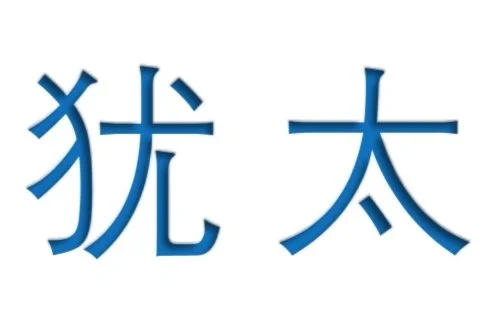Chinese Character for Jew
For close to a thousand years, Judaism in China was called Tiao Jing Jiao (挑筋教), literally translated into “religion that removes sinew” which refers to the kosher practice against eating the sciatic nerve. It is probable that the Jewish dietary habits made the community stand out amongst its neighbours. The Jews referred to themselves as Yicileye (一赐乐业).This name originated in the Song Dynasty and was explicitly used in the Ming Dynasty texts. Yicileye was a transcription of the name Israel but unrelated to the current name for the state of Israel, whose official transcription isYiselie (以色列). Non-Jews sometimes called the Jews the Blue-hat Muslims (蓝帽回). Han Chinese had difficulty distinguishing the Jews from the Muslims and picked up this visual difference because the Jews in China tended to wear blue kippahs whereas Muslims white.
Using the words Youtai (犹太) to refer to Jew is a relatively recent phenomenon. The words first appeared in 1833, on the Eastern Western Monthly Magazine which was edited by Karl Friedlich Gutzlaff, a German Lutheran missionary. Youtai is not an adaptation of the English word Jew, but a transliteration of the Hebrew word Yehudim which is Judaeus in Latin. The consonant "j" is pronounced as a palatal approximant, just like the initial consonant "y" as in the word yesterday. When the missionaries were translating the Old Testament and New Testament into Chinese and needed a term for Jews, they had to create one. Considering the prevailing anti-Semitism in Europe at the time, some speculated that that it was possible the missionaries intentionally chose the Chinese character 犹, with a dog radical to the left, instead than the plain and simple 尤, both of which carried the exact same pronunciation, because of its derogatory meaning.
Chinese is logographic. Some even argue that the strong presence of radicals makes it a root language. For example, out of the roughly 214 radicals,犭has to do with dogs, 氵with water, 灬with fire and 忄with heart. The characters of course do not take on the full meaning of the radical, but they do relate in various ways to the intrinsic meaning carried by the radical.
犭is a variant of 犬 which means dog. Some of the commonly used characters that carry this semantic component are: 猫 (cat), 狗 (dog), 猪 (pig), 猴 (monkeys), 狮 (lions), 狐狸 (foxes), 狼 (wolf), 猛 (violent), 犯 (commit crime), 犷 ( rude, uncivilised), 狂(insane, wild), 狡猾 (crafty, cunning) and 狯 (sly). It is obvious these are mostly not very positive connotations. In Chinese culture, to insult someone is often to call them or compare them to a dog. The ancient Chinese have liberally assigned the 犭 radical to the ethnic minorities that they felt were beneath them or culturally not as advanced as themselves, such as 猺族 (Yao ethnic minority) or 獞族 (Zhuang ethnic minority).
For the 1956 People’s Congress, Chairman Mao Zedong envisioned China to be a country of multi-ethnicities (多民族国家) and wanted all ethnicities to be present at the meeting. China subsequently officially recognised 56 ethnicities, including Han. The character simplification and ethnic classification projects which were completed in the same year, replaced the dog radical in the names of almost all ethnic minorities with more positive characters. For example, 猺族 (Yao ethnic minority) became 瑶族, dog radical changed to jade radical, pronunciation stayed the same; 獞族 (Zhuang ethnic minority) became 壮族, dog radical changed to soldier radical, pronunciation also stayed the same. However, 犹太 (Jew) remained unchanged.
This now begs the question – why was it not changed? Some believed China only focused on its officially recognized ethnicities at the time and Jews were not one of them. Regardless, 犹太 (Jew) is now, some would argue, the only Chinese character with dog radical that is still used to describe a people.
Is there a need to look for other word choices for Jew in Chinese? Would the same characters, with the dog radical dropped, 尤太 (exact same pronunciation) be a possible candidate? Would the same characters, but have the dog radical replaced by the person radical, 优太 (same pronunciation but different tone) be another possibility? What about completely different, but neutral words, that sound the same? Or, since this is not a matter that most people even notice and China has never been a country of anti-Semitism, perhaps the negative connotation to the words doesn’t really exist and thus no change is necessary. It’s good to discuss.
